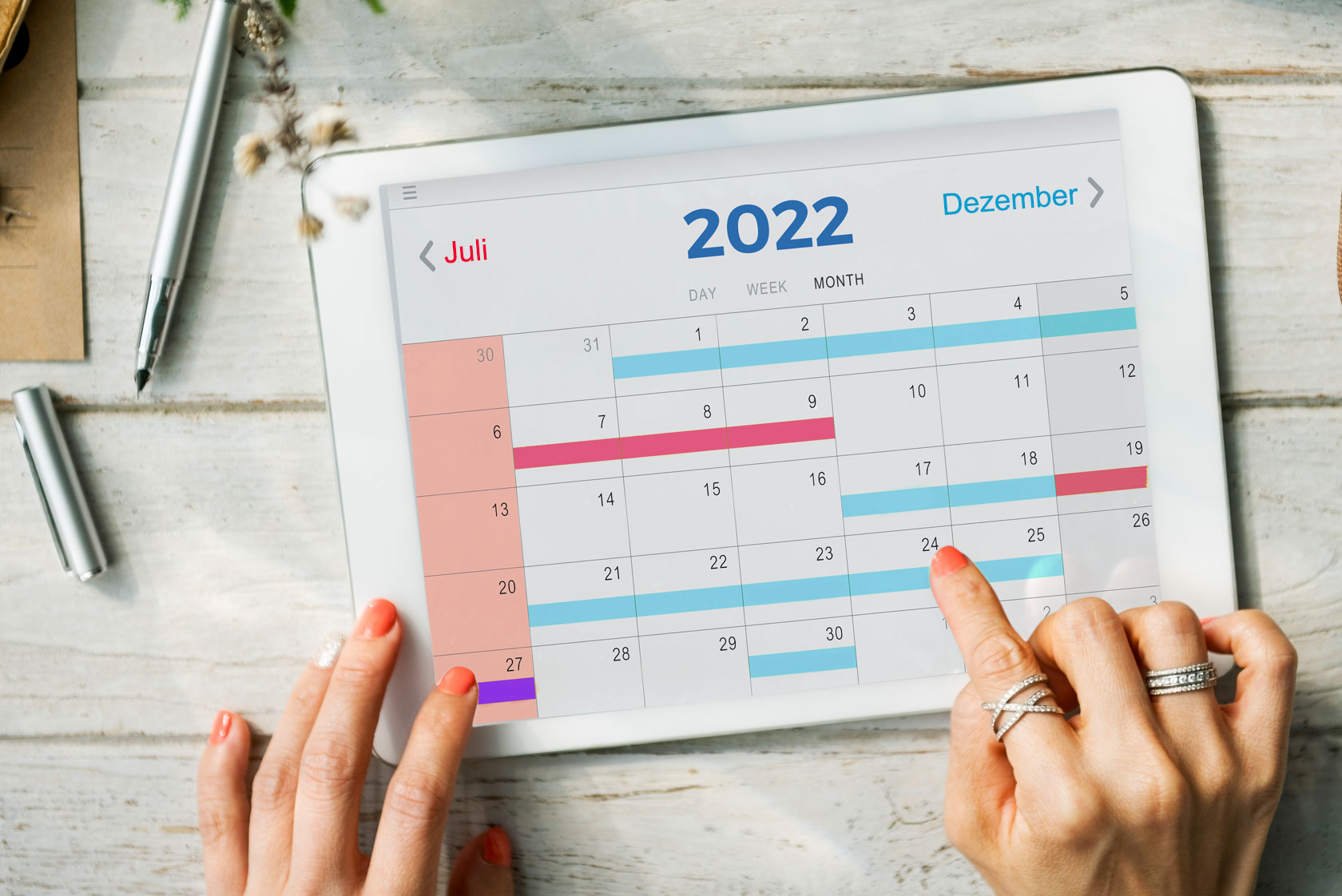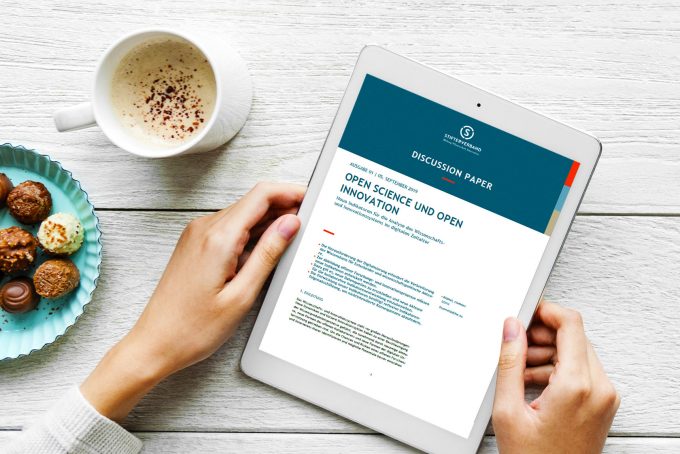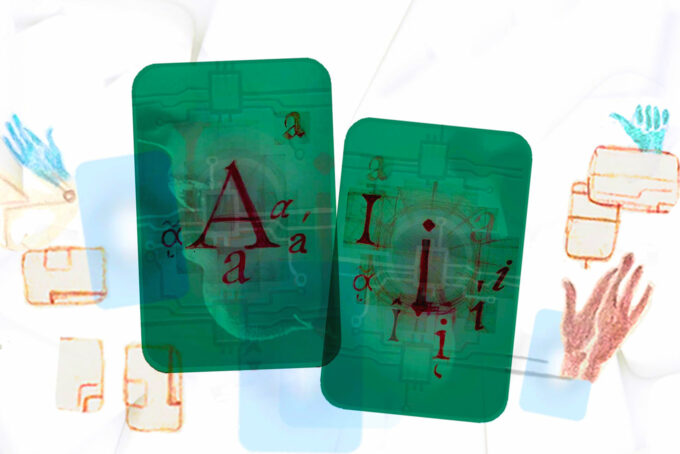
Open Science & Libraries 2022: 22 Tips for Conferences, Barcamps & Co. – Part 2
Which conferences and events might be worth a (online) visit in the 2nd half of 2022? We have put together a selection of events around Open Science and libraries. Here are our 22 favourites:
Of our event tips for the 2nd half of 2022, it is mainly the events in summer and early autumn that take place onsite (eleven of them). The later the year, the more they move back into the digital world (eight of them). Only a total of three events will be held in the new hybrid format on-site and online. It seems that organisers all over the world are not enthusiastic about the hybrid format after all.
In our event tips for July to December 2022, you will find all facets of the new event world: purely digital, hybrid and, above all, classic on-site event formats. Below you will find a selection of conferences, workshops, barcamps, festivals and other events that you should not miss in the second half of 2022. You can find more interesting events in the ZBW MediaTalk event calendar.
#01 – Open Space | 05.07. | Berlin (Germany)
Organised by: Forum for Open Innovation Culture (innOsci)
Open Science und Open Innovation – Pretty Best Friends?!
“This Open Space is intended to be an ‘open space’ in the truest sense of the word for the topics that are close to the hearts of our community. The title forms the bracket and is intended to invite us to take a deeper look at the question of how we can bring together Open Science & Open Innovation for the benefit of all and perhaps also think in a completely new way in order to meet the social challenges of our time and shape transformation.“
#02 – Conference | 06.07. – 08.07. | Odense (Denmark)
Organised by: Ligue des Bibliothèques Européennes de Recherche – Association of European Research Libraries (LIBER) and University Library of Southern Denmark / Syddansk Universitetsbibliotek
LIBER Annual Conference 2022
“LIBER 2022 Annual Conference Theme: Libraries in the Research and Innovation Landscape — Supporting, Partnering, Leading. The upcoming LIBER 2022 Annual Conference will address the following topics: Libraries as research institutions; Citizen science and research communication; Partnering with other organisations and the private sector; Community building for researchers; Research libraries as publishers; Role of research libraries in bibliometrics; Special collections in research libraries.”
#03 – Summer School | 11.07. – 15.07. | Zurich (Switzerland)
Organised by: University of Zurich
Open Science Summer School 2022
“Are you unsure what FAIR data is, or how to write a data management plan? Are you wondering about copyright, or how to manage sensitive data properly? Do you want to know more about the various Open Access roads, and how you can avoid predatory journals? You will have the opportunity to gain a deeper insight into the world of open data, research data management, and open access.”
#04 – Conference | 13.07. – 16.07. | Leiden (Netherlands)
Organised by: Leiden University, the Municipality of Leiden, Leiden University of Applied Sciences, and the Leiden University Medical Center (LUMC)
EuroScience Open Forum 2022: Crossing the borders, engaged science, resilient society
“The main objective of ESOF2022 is to strengthen the trust in the various ways society is influenced by science and, on the other hand, how science is influenced by choices, dilemmas and responsibilities that arise in society. ESOF2022 will be about the creation of a sense of urgency in scientists, policy makers, media, and the general public to deliberate more actively on science. ESOF2022 in Leiden will reinforce the societal dimension of European research-recognising that citizen engagement is intrinsic to the support of science and to appreciate the benefits of science for the economy and quality of life. ESOF2022 conference with the theme ‚Crossing the borders, engaged science, resilient society‘ is embedded in a 365-day programme of Leiden European City of Science where we will celebrate arts, science, and technology, targeted to reach out to the general public and truly connect science with society.”
#05 – Conference | 26.07. – 29.07. | Dublin (Ireland)
Organised by: International Federation of Library Associations and Institutions (IFLA)
87th IFLA World Library and Information Congress: Inspire, Engage, Enable, Connect
“An abundance of innovative and thought-provoking sessions awaits you, including: Digital skills on fire workshop – Fighting fake information at your library – Agile in the library: methods and tools for project management, collaboration and innovation – Inspire: how the SDGs can change your life – Equity, diversity, inclusion: intersectional issues in libraries – Librarians as evidence intermediaries during times of crisis – Climate Action in libraries: creating a more sustainable future by engaging and inspiring youth – Telling the next chapter: marketing libraries of the future – Infodemic management: strategies for combatting health mis/dis/malinformation – Truth, evidence and memory: Academic Libraries as cultural rights defenders – Information access through cooperation: models from libraries serving persons with print disabilities – European libraries in a time of war: responses to the crisis in Ukraine – Artificial intelligence: new horizons and implications for libraries.”
#06 – Conference | 30.08. – 31.08. | Hannover (Germany)
Organised by: Leibniz University Hannover (LUH) and TIB – Leibniz Information Centre for Science and Technology and University Library
Das erste deutsche Open Science Festival: Meet. Share. Inspire. Care.
“Exchange and impulses on Open Science practices with (inter)national experts – A place to network with other scientists – Practice-based workshops – A marketplace with information on local and international initiatives and services.”
#07 – Conference | 01.09. | Amsterdam (Netherlands)
Organised by: National Program Open Science (hereafter: NPOS)
Netherlands National Open Science Festival: Meet / Share / Inspire / Care
“This year the festival contains two tracks: Track 1: Open Science in Practice (all day) invites active researchers working in the Netherlands. The parallel track 2: Open Science in Policy (afternoon) invites everyone interested in Open Science policy. Join us to learn more about Open Science practices in research and current policy in the Netherlands. Plus, you’ll get to meet researchers in the Netherlands who already work openly or want to get started as well as Open Science policy makers.”
#08 – Conference | 13.09. – 14.09. | Online
Organised by: Technical University of Applied Sciences Wildau
14th Wildau Library Symposium: Best of Failure
“Everyone agrees that a culture of innovation requires a willingness to take risks and an error culture. But what specifically can help to live both in practice in everyday library life? Under the working title ‚Best of Failure” (or ‚Failing Beautifully‘, ‚Protypes Create Types‘, ‚FuckUp Night‘), we will first collect together with the participants what can be included in an overview. Then we will work out how acceptance and transparency can find a permanent place for it. The goal is a systematic collection that can be used as a ‘lesson learned’ for project-initiated library work. There should be enough failed ideas/projects/solutions. They are a treasure if one draws the right conclusions from them for similar approaches, whether e.g. in the use of discovery tools, lending operations, QR codes, media acquisition, RFID devices, etc.”
#09 – Conference | 19.09. – 21.09. | Bern (Switzerland)
Organised by: University Library Bern
Open-Access-Tage 2022: Kollaboration
“The developments in the publication system towards more openness lead to an increase in the number of actors, institutions, infrastructures, interests, technologies, professions, etc. involved, who bring their own demands, requirements, interpretations, needs, standards, languages, etc. with them. One of the current challenges for OA is therefore how these actors and interests interact and how they can be included and taken into account. This raises questions such as: Which collaborations are desirable? What positive and negative experiences have we had? How should collaborations be designed in the sense of Open Access and Open Science? Do collaborations change the institutions in which we work? Which collaborations are particularly valuable strategically? Which ones should we strive for? What forms of collaboration exist? The following dimensions of collaboration are particularly important to us at the Open Access Days: Collaboration among people: different languages, assessments, prerequisites, competencies, interests and values – Collaboration between machines: Interoperability, services, infrastructures, exchange of (meta-)data, dashboards – Collaborative structures and mechanisms: different institutions, cultures, processes, goals and requirements.”
#10 – Conference | 19.09. – 23.09. | Berlin (Germany)
Organised by: QURATOR Bündnis
QURATOR 2022 – Third Conference on Digital Curation Technologies
“The Qurator conference provides a forum on the use of digital curation technologies in application domains for, e.g., media, journalism, logistics, cultural heritage, health care and life sciences, energy, industry. Of particular relevance are submissions that demonstrate the applied use of digital curation technologies and tools in domain-specific use cases and that bridge traditional boundaries between disciplines such as Artificial Intelligence and Semantic Web, data analytics and machine learning, information/content and knowledge management systems, information retrieval, knowledge discovery, and computational linguistics.”
#11 – Conference | 20.09. – 22.09. | Online
Organised by: Open Access Scholarly Publishing Association (OASPA)
OASPA Online Conference on Open Access Scholarly Publishing 2022
“The 2022 online conference will encourage participants to think Beyond Open Access to equitable open scholarship and science practices and will address many timely and fundamental topics relating to open scholarly communication. These include, and are not limited to: The University Leadership Role in Delivering Equitable Open Access; Connecting Vision to Practice: what needs to happen to ensure recent recommendations are met; Common Good and Open Access; Humanities and Open Scholarship; Indigenous Knowledge; Open Science Knowledge Amongst Researchers; Has open science failed to influence research assessment?; Pathways to Open Access: Values-based publishing models.”
#12 – Conference | 28.09. – 30.0.9 | The Hague (Netherlands) & Online
Organised by: Europeana Foundation
EUROPEANA 2022
“We aim to explore how we can collaboratively build a common data space for cultural heritage and raise voices from across the sector to empower digital transformation and explore the role digital cultural heritage plays in today’s and tomorrow’s world.”
#13 – Workshop | 12.10. – 13.10. | Online
Organised by: Landesinitiative für Forschungsdatenmanagement (fdm.nrw)
Train-the-Trainer Workshop zum Forschungsdatenmanagement
“The two-day workshop is aimed at people who want to teach the basics of research data management in their field of work or at their institution and, based on this, want to set up or expand RDM services for their locations. In addition to didactic approaches, methods and the seminar structure, the following topics will be covered: Research data life cycle – Research data policies – Data management plan – Structuring of data – Documentation – Storage and backup – Long-term archiving – Access security – Publication of research data – Post-use of research data – Legal aspects.”
#14 – Conference | 17.10. – 20.10. | Online
Organised by: Open Education Conference Board of Directors
Open Education Conference 2022: Rise to Action
“The Open Education Conference (‚OpenEd‘) is an annual convening for sharing and learning about Open Educational Resources, Open Pedagogy, and Open Education Initiatives. This dynamic gathering celebrates the core values of Open Education that strive to realise education ecosystems that are accessible, affordable, equitable and inclusive to everyone, regardless of their background. As of 2022, the conference transitioned to leadership by a community-elected board of directors, guided by a strategic vision.”
#15 – Conference | 18.10. – 19.10. | Online
Organised by: Science Europe AISBL
Science Europe Open Science Conference 2022
“At the Open Science conference, we will provide a comprehensive overview of the current policy initiatives, research assessment reforms, and financial measures that support the transition to Open Science, and look forward at new trends. We will also explore the impact of the transition on the daily reality of researchers, their teams, and institutions, and discuss ways to make the transition to Open Science fair and equitable.”
#16 – Conference | 19.10. – 21.10. | Brno (Czech Republic)
Organised by: European Commission; Masaryk University; the Ministry of Education, Youth and Sports of the Czech Republic under the auspices of the Czech Presidency of the Council of the European Union; and CEITEC – Central European Institute of Technology
International Conference on Research Infrastructures (ICRI 2022)
“A major worldwide event providing an opportunity for strategic discussions about international cooperation in research infrastructure. A variety of experts and stakeholders discuss challenges and emerging trends, highlighting the essential role of research infrastructures. Every two years since 2012, ICRI has hosted about 500 delegates, who discuss topics concerning research infrastructures on the international level.”
#17 – Webinar | 25.10. – 26.10. | Online
Organised by: Technology Arts Sciences TH Köln – University of Applied Sciences
Agenda 2030 – Libraries on the Road to Environmental Sustainability
“With the Sustainable Development Goals of the UN Agenda 2030 adopted in 2015 and the new edition of the German Sustainability Strategy of the Federal Government, libraries are also called upon to make their contribution to sustainable development. Only recently there have been further clear impulses in the library world (Libraries4Future, Network Green Library). In this seminar, experiences are to be conveyed on how one can contribute to sustainable development in and with libraries. The focus is less on structural aspects and more on what can be influenced practically and in everyday life in libraries: Energy saving, cleaning and maintenance, green IT, services for library users, library administration, the green library office, library strategy and marketing.”
#18 – Conference | 26.10. – 28.10. | Leiden (Netherlands)
Organised by: FAIR Digital Objects Forum
1st International Conference on FAIR Digital Objects: Turning the Internet into a meaningful data space
“We need to act now. We have been living a data revolution for decades now. Every day, peta bytes of information of all kinds are generated and made accessible on the Internet. The amount of data is indeed so massive and varied that it is not feasible for humans to make sense of it using current processes and standards. What to do then? We can keep on creating and publishing information but will we manage it, use it, interpret it and exchange it efficiently? Turning the Internet into a meaningful data space. Successful management, exchange and interpretation of knowledge in an ever-growing information tsunami will depend on highly automated methods dealing with combined data. This will require artificial intelligence but also robust and informative ways to store and disseminate data and metadata. Here is where one crucial concept shows up: FAIR Digital Objects (FDOs).”
#19 – Conference | 03.11. – 04.11. | Online
Organised by: Kiel University of Applied Sciences and Kiel University
TURN Conference 2022: Shaping Change – Teaching and Learning Today, for the Challenges of Tomorrow
“We all know: The world is changing. Fast. In many areas. Students and graduates should be able to tackle and master the challenges of the present and the future and thus actively shape social change. Universities are thus faced with tasks and requirements on a strategic and cultural level as well as on a structural and practical level, which will be discussed at the TURN Conference 2022. In addition to all members of higher education institutions, we also cordially invite social actors and others interested in the topic to participate in Kiel. Participation in the TURN Conference 2022 is free of charge.”
#20 – Conference | 14.11.- 17.11. | Prague (Czech Republic) & Online
Organised by: European Open Science Cloud (EOSC)
EOSC Symposium 2022
“The next EOSC Symposium It will bring updates from across the EOSC ecosystem. It will coincide with the Second EOSC Tripartite Event . Stay tuned for the full programme with exciting speakers and topics.”
#21 – Conference | 29.11. – 01.12. | Tromsø (Norway) & Online
Organised by: The Arctic University of Norway (UiT )
17th Munin Conference on Scholarly Publishing 2022
“The Munin Conference is an annual conference on scholarly publishing and communication, primarily revolving around open access, open data and open science. This year the Munin conference has a special focus on interactivity and discussions. Submissions will be published before the conference to allow for a ‚flipped conference‘ format. Participants will have to get acquainted with the content of submissions before the conference, whereas during the conference the focus will be on discussions and other interactive work with the content. (…) The (..) three main topics for this year’s Munin conference: Economics and equity in Open Science infrastructures; Open Science policies; Connecting the building blocks of Open Science.”
#22 – Conference | 07.12. – 08.12. | Online
Organised by: TIB – Leibniz Information Centre for Science and Technology and University Library, Berufsverband Information Bibliothek (BIB) and Leibniz Association
#vBIB22 – Virtual Conference for Digital Library and Information Topics
“We are committed to openness and exchange. Curiously looking beyond one’s own nose enriches and broadens one’s own horizon. That is why we are focusing on digital perspectives with #vBIB22! (…) In 2022, there will again be exciting keynotes on this year’s main themes of change, future and sustainability. Specifically, it will be about futurology and work 4.0 – but more is not yet revealed. The other half of the programme is all yours – the #vBIB community. And we wouldn’t be the #vBIB if we didn’t try something new again this time.”
Events 2023: How to stay up to date!
These were our event tips for the Open Science and library world for 2022. Of course, there will be more exciting conferences, workshops, barcamps and other formats in the course of the year. We will collect these for you in our event calendar on ZBW MediaTalk!
To stay up to date on interesting events, you can drop by there or subscribe to our newsletter. There we will inform you once a week about new highlights on the Open Science and library event horizon.
Missing an event?
Do you have an event tip that is not yet listed in our event calendar? Then we would be pleased if you let us know.
Despite the pandemic-related obstacles, there were already many worthwhile conferences, workshops, festivals, barcamps & co. in the first half of 2022. We have already recommended 22 of them in the first part of this article: Open Science & Libraries 2022: 22 Tips for Conferences, Barcamps & Co.. We have reported on some of them in more detail here on ZBW MediaTalk. So if you are thinking about visiting one of the events we recommended, our review of them will certainly help you in your decision-making:
- Open Access Barcamp 2022: Where the Community Met
- Workshop Retrodigitisation 2022: Do It Yourself or Have It Done?
- Barcamp Open Science 2022: Connecting and Strengthening the Communities!
- Open Science Conference 2022: New Challenges at the Global Level
- First Open Science Retreat: On the Future of Research Evaluation
- Reseach Data Management: We Need to Pick up the Pace
- Open Access Days 2021: Highlights and Most Interesting Topics
Further reading tips for event organisers:
Do you organise events yourself and are looking for tips on how to make them even better? We have been dealing with this more frequently lately:
- Rethinking Events Digitally: a ZBW Guide for Successful Online Events
- Libraries and online events, part 1: How to plan a successful event
- Libraries and online events, part 2: How to conduct successful conferences and meetings
- Libraries and online events, part 3: How online workshops encourage new ideas and collaboration
This text has been partly translated from German.
Claudia Sittner studied journalism and languages in Hamburg and London. She was a long time lecturer at the ZBW publication Wirtschaftsdienst – a journal for economic policy, and has been the managing editor of the blog ZBW MediaTalk. She is a freelance travel blogger, speaker and author. She can also be found on LinkedIn, Twitter and Xing.
Portrait: Claudia Sittner©
View Comments

The Ideal Place for Students to Learn: Results of a ZBW Photo Study
Students were hit hard by the pandemic: Normally found in lecture halls, seminar...



